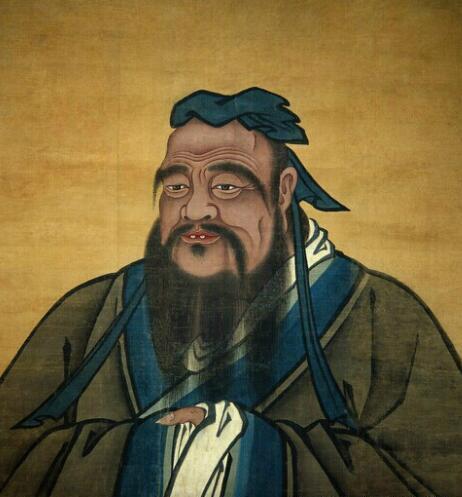Speaking of Confucius, everyone knows that as the master of the Confucian school, he not only continued to influence the Chinese people for more than two thousand years, but also had a huge influence on the Korean Peninsula, Japan, Vietnam and other countries, and even in the whole world.
In fact, in the current Korean Peninsula, there is also a Confucius-like figure, who is known as the "Sect of Eastern Confucianism" by the people of the peninsula, and is also considered to be the founding father of Sinology on the Korean Peninsula, this person is Cui Zhiyuan.

Confucius
Choi was born in the Silla era, when China was in the Tang Dynasty, although it was already the late Tang Dynasty, the tang dynasty's inclusiveness and sea of hundreds of rivers, from the early Tang Dynasty to the late Tang Dynasty, has always attracted people from all over the world to study. And Choi is one of the international students in Silla.
Cui Zhiyuan, who first entered Datang, was only 12 years old, and when he embarked on a long-distance voyage that year, his father once said to him, if you go to Datang to study this time, if you can't enter high school within 10 years, then don't say that you are my son, and I will not say that I have a son. In this way, the young Cui Zhiyuan carried the ardent expectations of his old father and came to Chang'an, the capital of the Tang Dynasty, which he had longed for for a long time.
Cui Zhiyuan
At the Tang Dynasty National Academy in Chang'an, Cui Zhiyuan tirelessly immersed himself in the Confucian classics. He really did not disappoint his father, and in just 6 years, Cui Zhiyuan was a high school scholar in the Tang Dynasty's imperial examination, which really let people see the talent of this foreign child. Winning the Jinshi means that he is qualified to become an official of the Tang Dynasty. At the age of 18, Cui Zhiyuan was entrusted with an official position by the Tang Dynasty and became a lieutenant of Lishui County. During his four years as an official in liyang, jiangsu province, he had the opportunity to contact The lower classes of China, during which time he created many works sympathetic to the sufferings of the people.
Soon, the nightmare of the Tang Dynasty came. In 874, after Wang Xianzhi raised an army, Huang Chao responded in Shandong and began an era of war. Huang Chao led his troops from Shandong to attack Anhui and Henan, and then led his troops south, and the people of Jiangnan were also involved in the war.
HuangChao film and television image
At this time, Cui Zhiyuan was hired by Gao Biao as an official by Huainan Jiedushi and became Gao Biao's senior staff. When Gao Biao was determined to fight against Huang Chao, Cui Zhiyuan wrote the popular "Book of Huang Chao", in which he reprimanded Huang Chao for "the grace of forgiveness of sins by the holy Lord Yu Ru, and the sin of Gu En in the state", and questioned Huang Chao "when there is no day for death, why not fear heaven?" This article was widely circulated and caused a great influence in the public opinion at that time. However, as Gao Biao became more and more corrupt, cui Zhiyuan, who had a wind and bone, was not willing to follow his mediocrity, so he wrote to Gao Biao and expressed his desire to return to his homeland.
Tang Dynasty film and television image
In 884, the 28-year-old Choi Chi-won returned to Silla for his prestige and achievements in the Tang Dynasty, Choi Ge-won was valued by the Silla Kingdom, the King of Silla ordered him to serve as a Hanlin scholar, and Choi Ji-won, who was bent on serving the country, also actively spoke to the imperial court, and he wrote 11 "Current Affairs Policy" to deal with the Silla Dynasty, which had begun to decline at that time. However, he did not get the approval of the rulers, and eventually he was demoted, and after middle age, Cui Zhiyuan was discouraged, so he took his family to live in seclusion in the mountains and lived a leisurely life.
Bronze statue of Cui Zhiyuan
How high is Choi's achievements on the Korean Peninsula? After the fall of Silla, the Goryeo Dynasty was established. Cui Zhiyuan was posthumously honored as the Marquis of Wenchang and was worthy of the Temple of Literature. By this time, Cui Had been elevated to the point of approaching Confucius. His descendants also enjoy privileges such as military service in Korea. Historians of the Korean Peninsula have always believed that it is precisely because of Cui's achievements in Chinese literature that to a large extent contributed to the rise of sinology on the Korean Peninsula.
In all parts of Korea today, there are still many ruins of Choi Ji-won. For example, the Zhiyuan Peak of Qingliang Mountain, the Bachelor Building of Tianling County, and so on. The establishment of the Cui Zhiyuan Memorial Hall in Jiangsu, China, is one of the important attractions that people on the peninsula must visit to China, which shows the special status of this "Korean Confucius" in the hearts of the peninsula and the people of Chinese and the great contribution he has made to the promotion of Han culture.
Cui Zhiyuan Memorial Hall
bibliography: Cui Zhiyuan: "Guiyuan Pen Cultivation Sequence" HE Zhenhua. Choi Ji-won, a Silla poet in Joseon, and his work Journal of Yanbian University Lu Xiangji: Preface to the Reissuance of the LoneLy Fang Anthology